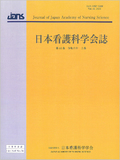Japanese
English
- 販売していません
- Abstract 文献概要
- 参考文献 Reference
要旨
目的:卓越した看護実践を行うジェネラリスト・ナース(ハイパフォーマー)の看護実践内容とその獲得に至る背景を明らかにする.
方法:所属長の推薦があった16名に半構造化面接を実施し,継続比較分析及び質的内容分析を行った.
結果:【タイミングを図って患者・家族に意図的に介入する】【やり取りを通して患者が納得して主体的に取り組める姿勢を引き出す】など看護実践7カテゴリが生成された.また〔患者の生活に寄り添い希望を叶えることを大切にすることが行動につながる〕など獲得背景5コアカテゴリが生成された.
結論:看護実践すべてのカテゴリに〔患者の生活に寄り添い希望を叶える〕獲得背景のコアカテゴリが関連した.実践の背景として患者を思う気持ちは不可欠であると考える.また卓越した看護実践のカテゴリに関連する獲得背景のコアカテゴリは複数あったことから,ハイパフォーマーの経験の多様性が示唆された.
Aim: To identify excellent nursing practice and its background factors associated with acquisition of excellent nursing practice by focusing on generalist nurses practicing excellence(high performers).
Methods: Department heads recommended 16 high performers for the study. Semi-structured interviews were conducted, and continuous comparative and qualitative content analyses were conducted.
Results: Seven categories of excellent nursing practice were generated: "intervening intentionally with the patient/family at the right time," "through dialogue, the patient is convinced and the patient's attitude becomes proactive" and so on. Five categories of background factors were found; "valuing being close to the patient's life and fulfilling their wishes leads to action" and so on.
Conclusion: The all categories of excellent nursing practice were related to the core category of background factors of valuing being close to the patient's life and fulfilling their wishes. Therefore, expressing feelings for patients/families is essential in supporting these practices. Moreover, multiple core categories of background factors were associated with outstanding nursing practice, suggesting that high performers have diverse experiences.
Copyright © 2024, Japan Academy of Nursing Science. All rights reserved.


